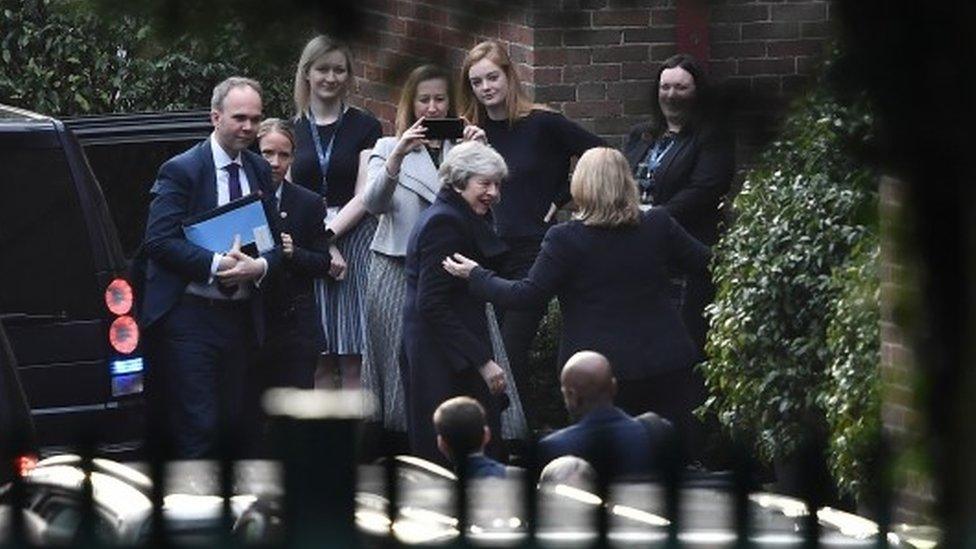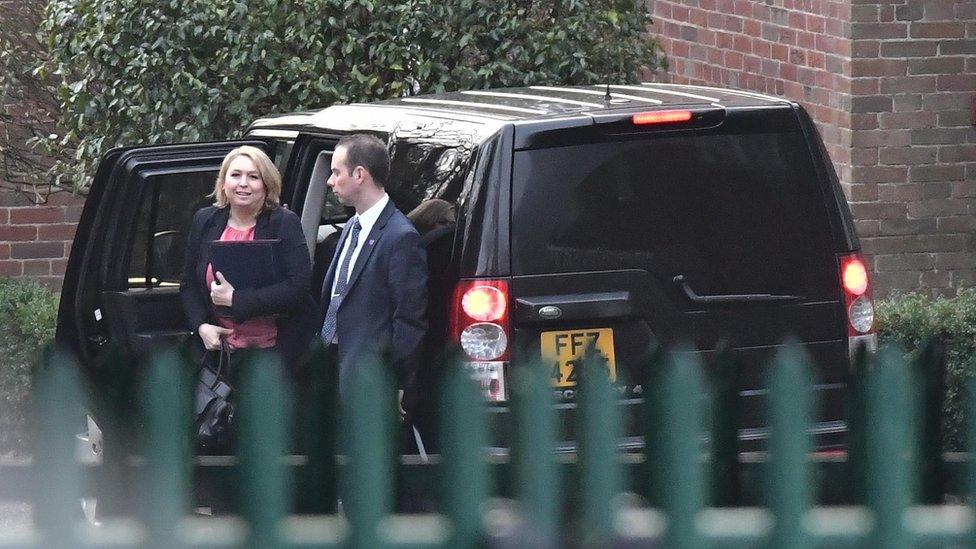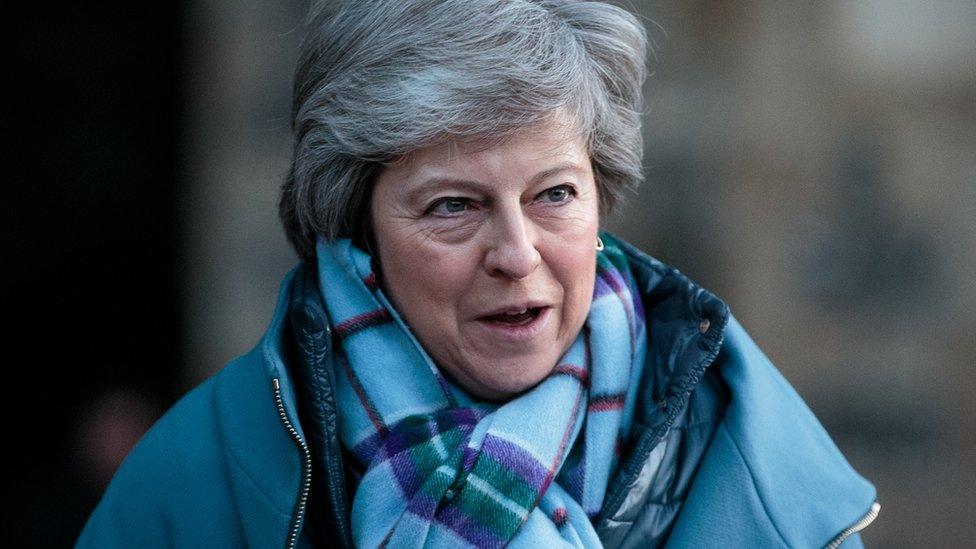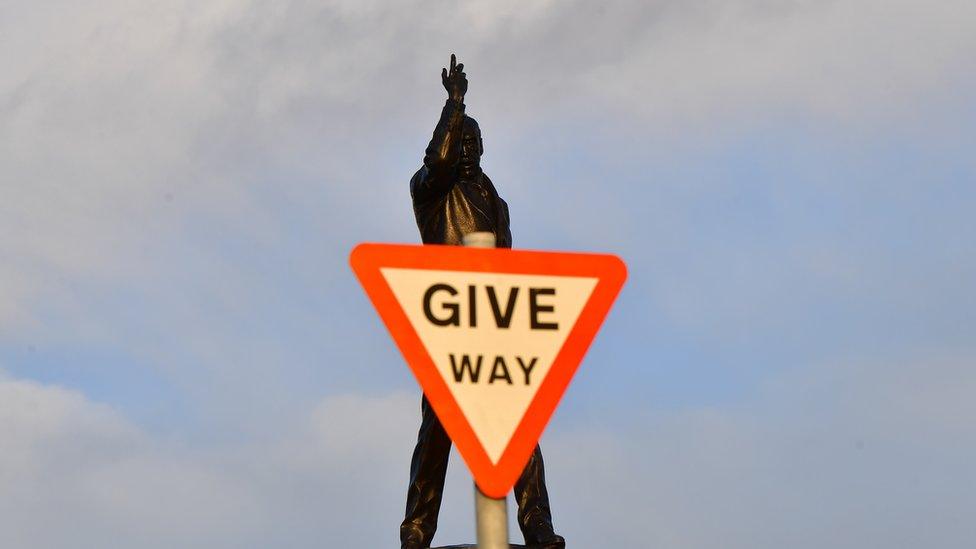May meets Northern Ireland politicians over Brexit
- Published
- comments

Theresa May is greeted as she arrives for talks at Stormont with Northern Ireland's main political parties
Theresa May has held talks about Brexit with Northern Ireland's five main political parties at Stormont.
The PM was on a two-day visit to try to reassure people she can secure a Brexit deal that avoids a hard border.
Speaking on Wednesday, European Council President Donald Tusk said the EU would "insist" on the Irish backstop.
Mr Tusk also said that there was a "special place in hell" for "those who promoted Brexit without even a sketch of a plan of how to carry it safely".
He was speaking after talks with Taoiseach (Irish PM) Leo Varadkar in Brussels.
In response to Mr Tusk's remarks, Northern Ireland Secretary Karen Bradley said "it is a delicate time and it is important we all consider our words carefully".
Mrs May is due to meet European Commission President Jean-Claude Juncker on Thursday in an effort to secure changes to her Brexit deal.
Theresa May has "no plan, no credibility and frankly no honour", says Sinn Féin's Mary Lou McDonald
The EU has maintained it will not renegotiate the withdrawal agreement, including the Irish border backstop.
On Tuesday, Mrs May told business leaders in Belfast that she wants changes to the controversial backstop but she suggested that she is not seeking to remove it from her Brexit deal.

Will May make 'good enough' progress?
Analysis by Laura Kuenssberg, BBC News Political Editor
Theresa May was in Northern Ireland meeting the different political parties - including the DUP, whose votes she needs in Parliament, who are totally opposed to the current version of the controversial backstop, as well as Sinn Féin, who are just as adamant that it must remain.
Tomorrow she will be in Brussels, asking again for the EU to amend the policy, seeking either a time limit or a legal upgrade to the promise that both sides will only use it if they really, really, really have to, and they don't expect it to last for ever.
In short, Wednesday has been a chance for the PM to test out what she'll ask for; tomorrow is an opportunity to sell it as hard as she can in Brussels.
Remember she has asked for these changes before and been turned down.
And she's heard before from both sides in Northern Ireland how dug in their positions are.
So can she do anything other than take one more turn around the same carousel while the clock ticks down?
Read more here.

Who did the PM meet on Wednesday?
Mrs May held meetings about Brexit and Northern Ireland's political deadlock with Stormont's five biggest political parties:
The Democratic Unionist Party (DUP) - the Conservative Party's confidence-and-supply partner at Westminster
Sinn Féin
Social Democratic and Labour Party (SDLP)
Ulster Unionist Party (UUP)
Alliance Party
There has been no functioning devolved government since January 2017, when a row between the DUP and Sinn Féin over a flawed green energy scheme collapsed the power-sharing executive.
The leaders of the UUP, the SDLP and the Alliance Party gave their views after meeting the PM
It sparked a snap election but, since then, various talks processes have collapsed and the Northern Ireland Secretary Karen Bradley had to take control of financial matters and pass Stormont's budget bills through Westminster.
For almost 10 years before that, the DUP and Sinn Féin worked together in government under a system of mandatory coalition, where unionist and nationalist parties shared power.
What did the parties say after the meetings?
DUP
Leader Arlene Foster reiterated the party's opposition to the backstop and said Mrs May must "stand strong" in her talks with the EU.
Mrs Foster also said Mr Tusk's comments were "deliberately provocative and disrespectful" and that the pressure is mounting among EU leaders.
Brexit spokesperson Sammy Wilson responded to Mr Tusk's comments by calling him a "devilish euro maniac", and accused the European Council president of having "fanned the flames of fear" to try and overturn the referendum result.
Sinn Féin
President Mary Lou McDonald said Donald Tusk's words were "accurately reflecting the outrage" people in NI feel about how Brexit has been handled.
She added that the party's meeting with the PM was direct, but offered nothing new and she accused Mrs May of having "no honour".
Ms McDonald also reiterated the party's support for the backstop and that a border poll should take place if there is a no-deal Brexit.
The idea of a border poll was met sceptically on Tuesday by Tony Lloyd, Northern Ireland's shadow secretary of state, who said it was "not the most obvious thing we should rush into".
UUP
Leader Robin Swann said his party would not accept a time-limited backstop, something the PM suggested when his party met her.
He added that Mrs May wanted to focus on Brexit and the UUP had to "drag" her to a place where they could raise the restoration of Stormont.
Mr Swann said his party told her they wanted direct rule implemented in Northern Ireland if there is a no-deal Brexit.

Northern Ireland Secretary Karen Bradley arrives at Stormont ahead of Brexit talks
SDLP
Leader Colum Eastwood said that his party had told Mrs May that it is now time to "put up or shut up".
He said it was clear the backstop was the only viable solution, save keeping the UK in the single market and the customs union.
He added that he had been "infuriated" when the government voted in favour of an amendment last week that called for alternative arrangements to replace the backstop.
Alliance Party
Leader Naomi Long said the time for "assurances" about Brexit from the government was over, describing her party's talks with Mrs May as "constructive but very direct".
Ms Long reiterated that the party had heard nothing new from Mrs May and that it still backed the Brexit deal that included the backstop.
Where are we with the backstop?
What will become of the Irish border when the UK leaves the European Union?
The backstop is a commitment to avoid physical barriers or checks on the border between Northern Ireland and the Republic of Ireland, if no UK-EU trade deal is agreed before the Brexit transition period ends.
Many people fear the return of customs checks would put the peace process at risk.
In Tuesday's speech in Belfast, Mrs May said: "There is no suggestion that we are not going to ensure in the future there is provision for this insurance policy... the backstop."
However, she indicated she would seek changes to address concerns raised by MPs about its "potential indefinite nature" when they overwhelmingly rejected her Brexit deal.
Last week, MPs voted for an amendment tabled by Conservative grandee Sir Graham Brady - and backed by the PM - which "requires the Northern Ireland backstop to be replaced with alternative arrangements to avoid a hard border".
Many fear the "temporary single customs territory" created under the backstop plan would keep the UK tied to EU rules in the long term.
Downing Street has insisted the government is still considering alternatives.
What could the UK offer as possible backstop 'alternatives'?
On Wednesday, the Alternative Arrangements Working Group, comprised of Leave and Remain MPs, will conclude three days of talks aimed at finding other Brexit options that would avoid a hard border.
MPs have been looking at "alternative arrangements" to the backstop, which Mrs May has said she will discuss with EU leaders. They include:
a "trusted trader" scheme to avoid physical checks on goods flowing through the border
"mutual recognition" of rules with the EU
"technological" solutions
The UK is due to leave the EU at 23:00 GMT on Friday 29 March, when the two-year limit on withdrawal negotiations enforced by the Article 50 process expires.
Confused by Brexit jargon? Reality Check unpacks the basics.
If MPs approve a deal with Brussels, the parties will then have until the end of 2020 to negotiate a future trade deal.
If that is not in place by the end of this transition period, the backstop kicks in.
Without a deal, however, there would be no backstop and no transition period.
The prime minister has said she is "determined" to deliver Brexit on time but a number of cabinet ministers have indicated they would be willing to agree to a short extension to finalise legislation for Brexit.
- Published6 February 2019
- Published4 February 2019

- Published9 January 2019

- Published16 October 2019

